新视野大学英语读写教程(第二版)第一册课文原文
- 格式:pdf
- 大小:566.93 KB
- 文档页数:32

![《新视野大学英语读写教程(第二版)》[第一册]Section6A](https://uimg.taocdn.com/be106c6258fafab069dc021f.webp)

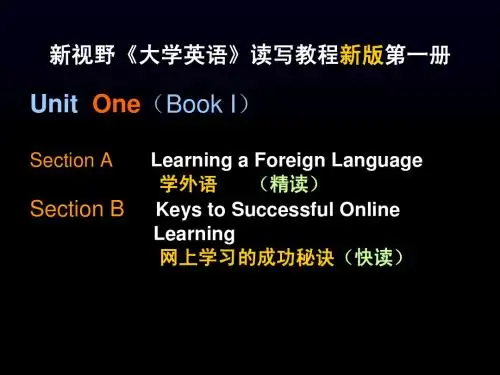

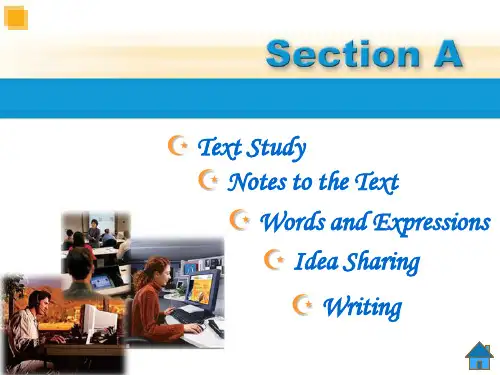
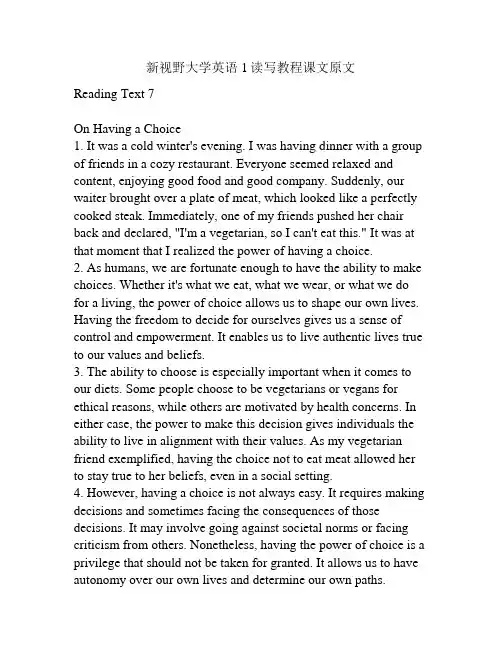
新视野大学英语1读写教程课文原文Reading Text 7On Having a Choice1. It was a cold winter's evening. I was having dinner with a group of friends in a cozy restaurant. Everyone seemed relaxed and content, enjoying good food and good company. Suddenly, our waiter brought over a plate of meat, which looked like a perfectly cooked steak. Immediately, one of my friends pushed her chair back and declared, "I'm a vegetarian, so I can't eat this." It was at that moment that I realized the power of having a choice.2. As humans, we are fortunate enough to have the ability to make choices. Whether it's what we eat, what we wear, or what we do for a living, the power of choice allows us to shape our own lives. Having the freedom to decide for ourselves gives us a sense of control and empowerment. It enables us to live authentic lives true to our values and beliefs.3. The ability to choose is especially important when it comes to our diets. Some people choose to be vegetarians or vegans for ethical reasons, while others are motivated by health concerns. In either case, the power to make this decision gives individuals the ability to live in alignment with their values. As my vegetarian friend exemplified, having the choice not to eat meat allowed her to stay true to her beliefs, even in a social setting.4. However, having a choice is not always easy. It requires making decisions and sometimes facing the consequences of those decisions. It may involve going against societal norms or facing criticism from others. Nonetheless, having the power of choice is a privilege that should not be taken for granted. It allows us to have autonomy over our own lives and determine our own paths.5. In a world where many people do not have the luxury of choices, it is important to recognize and appreciate this privilege. We should strive to make choices that align with our values and bring us joy and fulfillment. Whether it's choosing a career that we are passionate about or deciding to live a more sustainable lifestyle, our choices have the power to shape our lives and create a better world.6. To some extent, the power of choice is what defines us as human beings. It sets us apart from other species and gives us the ability to shape the world in which we live. So, the next time we are faced with a decision, let's remember the privilege we have in being able to choose. Let's embrace this power and use it wisely, making choices that reflect the values and beliefs that define us.。


Unit 1 Section A 时间观念强的美国人Para. 1 美国人认为没有人能停止不前。
如果你不求进取,你就会落伍。
这种态度造就了一个投身于研究、实验和探索的民族。
时间是美国人注意节约的两个要素之一,另一个是劳力。
Para. 2 人们一直说:“只有时间才能支配我们。
”人们似乎是把时间当作一个差不多是实实在在的东西来对待的。
我们安排时间、节约时间、浪费时间、挤抢时间、消磨时间、缩减时间、对时间的利用作出解释;我们还要因付出时间而收取费用。
时间是一种宝贵的资源,许多人都深感人生的短暂。
时光一去不复返。
我们应当让每一分钟都过得有意义。
Para. 3 外国人对美国的第一印象很可能是:每个人都匆匆忙忙——常常处于压力之下。
城里人看上去总是在匆匆地赶往他们要去的地方,在商店里他们焦躁不安地指望店员能马上来为他们服务,或者为了赶快买完东西,用肘来推搡他人。
白天吃饭时人们也都匆匆忙忙,这部分地反映出这个国家的生活节奏。
工作时间被认为是宝贵的。
Para. 3b 在公共用餐场所,人们都等着别人吃完后用餐,以便按时赶回去工作。
你还会发现司机开车很鲁莽,人们推搡着在你身边过去。
你会怀念微笑、简短的交谈以及与陌生人的随意闲聊。
不要觉得这是针对你个人的,这是因为人们非常珍惜时间,而且也不喜欢他人“浪费”时间到不恰当的地步。
Para. 4 许多刚到美国的人会怀念诸如商务拜访等场合开始时的寒暄。
他们也会怀念那种一边喝茶或咖啡一边进行的礼节性交流,这也许是他们自己国家的一种习俗。
他们也许还会怀念在饭店或咖啡馆里谈生意时的那种轻松悠闲的交谈。
一般说来,美国人是不会在如此轻松的环境里通过长时间的闲聊来评价他们的客人的,更不用说会在增进相互间信任的过程中带他们出去吃饭,或带他们去打高尔夫球。
既然我们通常是通过工作而不是社交来评估和了解他人,我们就开门见山地谈正事。
因此,时间老是在我们心中的耳朵里滴滴答答地响着。
Para. 5 因此,我们千方百计地节约时间。
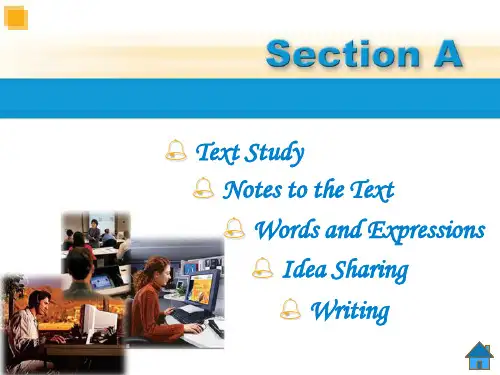
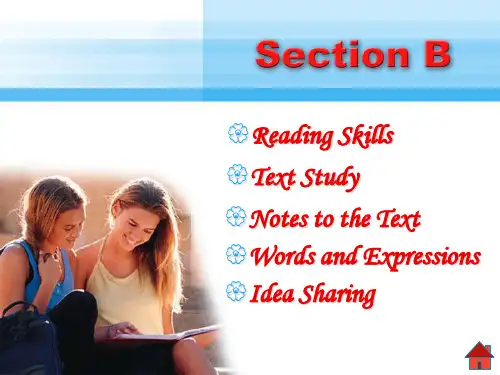
新视野大学英语读写教程第二册(第二版)Pre-reading听力原文Unit 1 第一单元SECTION A Pre-reading ActivitiesTime is the same in all places, but people’s relationship with time is different from country to country. In the United States, time is a real, precious resource, and every minute counts. People here are always in a rush and under pressure. There are no short conversations or small exchanges with strangers because people think it is a waste of time. Does this sound like your country? If it does not, and if you don’t think you would like such a place, you would most likely be unhappy in the United States, where doing things quickly is seen as a skill.1. Time.2. Short conversations or small exchanges with strangers.3. (Open-ended.)Unit 2 第二单元SECTION A Pre-reading ActivitiesWhen I think back about the many people who have influenced me during my life, I often think of one person who showed his passion through his commitment to my success. I think of my coach, the man who taught and inspired me not only how to run the mile as fast as I could, but also how to work at something a little every day until greatness is achieved. Through his continuous efforts, I gradually came to an understanding of the meaning of commitment, which is really what love is all about.1. Her coach.2. How to run the mile as fast as she could and how to work at something a little every day until greatness is achieved.3. (Open-ended.)Unit 3 第三单元SECTION A Pre-reading ActivitiesGail and Mark were from different cultural and racial background. They had been together for two years and had learned to understand and respect each other. Recently they decided to marry and they told the news to Gail’s parents. To their surprise, they met with some resistance. Gail’s mother was worried that they might be ma rrying for the wrong reasons and advised her daughter to wait. Gail’s father also opposed the marriage because he thought that Mark was marrying his daughter so that he could remain in the United States. Such concerns are understandable. After all, marriage across nations may have its problem of one kind or another.1. Gail’s mother was worried that they might be marrying for the wrong reason.2. Mark wanted to marry Gail so that he could remain in the United States.3. (Open-ended.)Unit 4 第四单元SECTION A Pre-reading ActivitiesI wrote a story about love, and I hope you like it. The story is about a young soldier who is waiting to see a woman he has fallen in love with. I suppose it’s a lot like my other stories in that it has a happy ending. Y ou might laugh at me for writing stories that are so sweet. But, you see, I am a deep believer in love, and I am hopeful about everyone finding it. Without love, I really don’t know what the purpose of living would be.4. He is waiting to see a woman he has fallen in love with.5. A happy ending.6. (Open-ended.)Unit 5第五单元SECTION A Pre-reading ActivitiesToday, I want to talk about the historic opportunity we now have to protect our children from an even more deadly threat: smoking. Smoking kills more people every day than AIDS, alcohol, car accidents, murders, drugs and fires combined. Nearly 90% percent of those smokers lit their first cigarette before they turned 18. In the past few years we’ve worked to stop our children from smoking before they start, to red uce their access to tobacco products, andto restrict tobacco companies from advertising to young people. If we do these, we’ll cut teen smoking by almost half over the next five years.1. Before they turned 18.2. To reduce children’s access to tobacco pr oducts, and to restrict tobacco companies from advertising to your people.3. ( Open-ended)自由作答,陈述各自的观点.Unit 6 第六单元SECTION A Pre-reading ActivitiesPre-reading ActivitiesThere are various reasons for our final decision on what name to give to a baby. For some it may simply because they come across a name that they feel is “it”. But for most people it may be a process of careful selection based on meaning, tradition, or parents’ wishes for their child. Whatever the naming method, a given name follow s the child throughout his or her life.How can parents decide on a name that will satisfy them? Consider the following: First, consider the area the child will grow up in when selecting a name. Second, choose a name based on some personal meaning so when the child asks why they’re named so, the parents will have a reasonable explanation. Finally, before deciding on a name, get opinions of people around! Chances are, if your friends and family members look shocked when you share your name selection, your child will probably be horrified as well.1.Meaning, tradition, or parents’wishes for their child.2. Three. Get opinions of people around.3. (Open-ended.)Unit 7 第七单元SECTION A Pre-reading ActivitiesStress can kill you. Being tense can damage your heart, so it is wise to take charge of your life and realize you cannot control everything. But you can control stress which is caused by fear, uncertainty, doubt, and lack of control. Anger may also be the root of this stress, especially for hard-working professional women and people with no goals in life. To relax and take control of your life, try the NICE factors: new, interesting, challenging experiences. And follow Ben Franklin’s example by writing down the major goals you want to achieve in your life. For the problems over which you have no control, you have to learn to go with the flow.1.Stress can be caused by fear, uncertainty, doubt, lack of control, and anger..2. The NICE factors are new, interesting, challenging experiences.3. (open-ended.)Unit 8 第八单元SECTION A Pre-reading ActivitiesWhat is life about? We work hard everyday to make more money, to gain power and recognition. We neglect our health, time with our family, the surrounding beauty and the hobbies we love. One day when we look back, we will realize that we don’t really need that much. We then will realize how much we have missed in life! Work definitely is not the whole of life. Work is meant to keep us living so that we enjoy the beauty and pleasures of life.Life is a balance of work and play, family and personal time. Happiness is the meaning and the purpose of life, the aim of human existence. So, live a balanced lifestyle and enjoy life!1.Our health, time with our family, the surrounding beauty and the hobbies we love.2. Happiness.3. (open-ended.)Unit 9 第九单元SECTION A Pre-reading ActivitiesI wasn’t the brightest kid in my graduating class. I didn’t even attend a famous school. What I did have, though, was a supportive family, and with their help, I was able to become one of the top lawyers in the state of Floridaand then a Florida State Supreme Court Justice. And you know what? It wasn’t as hard as you may think. It started with a clear set of rules: always get up early, always work hard, always do things honestly, always try to improve on the day before and never give up. When I was younger, I didn’t always remember the rules myself, so my father had to remind me. After a while, though, the rules became habit and everything else sort of fell into place.1. He owed his success to his supportive family.2. The rules were: always get up early, always work hard, always do things honestly, always try to improve on the day before, and never give up.3. (Open-end.) 开放性问题,可按自己的想法回答。
Unit 1 Learning a Foreign Language Learning Learning a a a foreign foreign foreign language language language was was was one one one of of of the the the most most most difficult difficult difficult yet yet yet most most most rewarding rewarding rewarding experiences experiences experiences of of of my my my life. life. Although at times, learning a language was frustrating, it was well worth the effort. My experience with a foreign language began in junior middle school, when I took my first English class. I had a kind and patient teacher who often praised all of the students. Because of this positive method, I eagerly answered all the questions I could, never worrying much about making mistakes. I was at the top of my class for two years. When I went to senior middle school, I was eager to continue studying English; however, my experience in senior school was very different from before. While my former teacher had been patient with all the students, my new teacher quickly punished those who gave incorrect answers. Whenever we answered incorrectly, she pointed a a long long long stick stick stick at at at us us us and, and, and, shaking shaking shaking it it it up up up and and and down, down, down, shouted, shouted, shouted, "No! "No! "No! No! No! No! No!" No!" No!" It It It didn't didn't didn't take take take me me me long long long to to to lose lose lose my my eagerness to answer questions. Not only did I lose my joy in answering questions, but also I totally lost my desire to say anything at all in English. However, that state didn't last long. When I went to college, I learned that all students were required to take an English course. Unlike my senior middle school teacher, my college English teachers were patient and kind, and none of them carried long, pointed sticks! However, the situation was far from perfect. As our classes were very very large, large, large, I I I was was was only only only able able able to to to answer answer answer a a a couple couple couple of of of questions questions questions in in in each each each class class class period. period. period. Also, Also, Also, after after after a a a few few few weeks weeks weeks of of classes, I noticed there were many students who spoke much better than I did. I began to feel intimidated. So, once again, although for different reasons, I was afraid to speak. It seemed my English was going to stay at the same level forever. That That was was was the the the situation situation situation until until until a a a couple couple couple of of of years years years later, later, later, when when when I I I was was was offered offered offered an an an opportunity opportunity opportunity to to to study study study English English through through an an an online online online course. course. course. The The The communication communication communication medium medium medium was was was a a a computer, computer, computer, phone phone phone line, line, line, and and and modem. modem. modem. I I I soon soon soon got got access to the necessary equipment, learned the technology from a friend and participated in the virtual classroom 5 to 7 days a week. Online Online learning learning learning is is is not not not easier easier easier than than than regular regular regular classroom classroom classroom study; study; study; it it it requires requires requires much much much time, time, time, commitment commitment commitment and and discipline to keep up with the flow of the course. I worked hard to meet the minimum standards set by the course and to complete assignments on time. I practiced all the time. I carried a little dictionary with me everywhere I went, as well as a notebook in which I listed any new words I heard. I made many, sometimes embarrassing, mistakes. Once in a while I cried with frustration, and sometimes I felt like giving up. But I didn't feel intimidated by students who spoke faster than I did because I took all the time I needed to think out my ideas and wrote a reply before posting it on the screen. Then, one day I realized I could understand just about everything I came across, and most importantly, I could "say" anything I wanted to in English. Although I still made many mistakes and was continually learning, I had finally reaped the benefits of all that hard work. Learning Learning a a foreign foreign language has language has been been a a most most trying trying trying experience experience experience for for for me, me, me, but but but one one one that that that I I I wouldn't wouldn't wouldn't trade trade trade for for anything. Not only did learning another language teach me the value of hard work, but it also gave me insights into into another another another culture, culture, culture, and and and my my my mind mind mind was was was opened opened opened to to to new new new ways ways ways of of of seeing seeing seeing things. things. things. The The The most most most wonderful wonderful wonderful result result result of of having learned a foreign language was that I could communicate with many more people than before. Talking with people is one of my favorite activities, so being able to speak a new language lets me meet new people, participate participate in in in conversations, conversations, conversations, and and and form form form new, new, new, unforgettable unforgettable unforgettable friendships. friendships. friendships. Now Now Now that that that I I I speak speak speak a a a foreign foreign foreign language, language, instead of staring into space when English is being spoken, I can participate and make friends. I am able to reach out to others and bridge the gap between my language and culture and theirs. 学习外语是我一生中最艰苦也是最有意义的经历之一。
教案Unit OneSection A1.Good afternoon! As president of the university, I am proud to welcome you to this university. Yourachievement is the triumph of years of hard work, both of your own and of your parents and teachers. Here at the university, we pledge to make your educational experience as rewarding as possible.1 下午好!作为校长,我非常自豪地欢迎你们来到这所大学。
你们所取得的成就是你们自己多年努力的结果,也是你们的父母和老师们多年努力的结果。
在这所大学里,我们承诺将使你们学有所成。
1 Your achievement is the triumph of years of hard work, both of your own and of your parents andteachers. (Para. 1)Meaning: Your entering this university is an important success. This success is due to many years of your hard work, and many years of your parents’ and teachers’ hard work.2 Here at the university, we pledge to make your educational experience as rewarding aspossible. (Para. 1)Meaning: Here at the university, we promise to make your educational experience as worthwhile as possible.rewarding: a. giving you satisfaction, pleasure, or profit 值得的;有意义的;有回报的Our journey to the orphanage was a very rewarding experience. 我们的孤儿院之行非常有意义。
新视野大学英语读写教程(第二版)第一册课文原文A\B及翻译.Unit 1Learning a Foreign LanguageP1Learning a foreign language was one of the most difficult yet most rewarding experiences of my life. Although at times, learning a language was frustrating, it was well worth the effort.P2 My experience with a foreign language began in junior middle school, when I took my first English class. I had a kind and patient teacher who often praised all of the students. Because of this positive method, I eagerly answered all the questions I could, never worrying much about making mistakes. I was at the top of my class for two years.P3When I went to senior middle school, I was eager to continue studying English; however, my experience in senior school was very different from before. While my former teacher had been patient with all the students, my new teacher quickly punished those who gave incorrect answers. Whenever we answered incorrectly, she pointed a long stick at us and, shaking it up and down, shouted, "No! No! No!" It didn't take me long to lose my eagerness to answer questions. Not only did I lose my joy in answering questions, but also I totally lost my desire to say anything at all in English.P4However, that state didn't last long. When I went to college, I learned that all students were required to take an English course. Unlike my senior middle school teacher, my college English teachers were patient and kind, and none of them carried long, pointed sticks! However, the situation was far from perfect. As our classes were very large, I was only able to answer a couple of questions in each class period. Also, after a few weeks of classes, I noticed there were many students who spoke much better than I did. I began to feel intimidated. So, once again, although for different reasons, I was afraid to speak. It seemed my English was going to stay at the same level forever.P5That was the situation until a couple of years later, when I was offered an opportunity to study English through an online course. The communication medium was a computer, phone line, and modem. I soon got access to the necessary equipment, learned the technology from a friend and participated in the virtual classroom 5 to 7 days a week.P6Online learning is not easier than regular classroom study; it requires much time, commitment and discipline to keep up with the flow of the course. I worked hard to meet the minimum standards set by the course and to complete assignments on time.P7 I practiced all the time. I carried a little dictionary with me everywhere I went, as well as a notebook in which I listed any new words I heard. I made many, sometimes embarrassing, mistakes. Once in a while I cried with frustration, and sometimes I felt like giving up. But I didn't feel intimidated by students who spoke faster than I did because I took all the time I needed to think out my ideas and wrote a reply before posting it on the screen. Then, one day I realized I could understand just about everything I came across, and most importantly, I could "say" anything I wanted to in English. Although I still made many mistakes and was continually learning, I had finally reaped the benefits of all that hard work.P8 Learning a foreign language has been a most trying experience for me, but one that I wouldn't trade for anything. Not only did learning another language teach me the value of hard work, but it also gave me insights into another culture, and my mind was opened to new ways of seeing things. The most wonderful result of having learned a foreign language was that I could communicate with many more people than before. Talking with people is one of my favorite activities, so being able to speak a new language lets me meet new people, participate in conversations, and form new, unforgettable friendships. Now that I speak a foreign language, instead of staring into space when English is being spoken, I can participate and make friends. I am able to reach out to others and bridge the gap between my language and culture and theirs.学习外语是我一生中最艰苦也是最有意义的经历之一。
虽然时常遭遇挫折,但却非常有价值。
我学外语的经历始于初中的第一堂英语课。
老师很慈祥耐心,时常表扬学生。
由于这种积极的教学方法,我踊跃回答各种问题,从不怕答错。
两年中,我的成绩一直名列前茅。
到了高中后,我渴望继续学习英语。
然而,高中时的经历与以前大不相同。
以前,老师对所有的学生都很耐心,而新老师则总是惩罚答错的学生。
每当有谁回答错了,她就会用长教鞭指着我们,上下挥舞大喊:“错!错!错!”没有多久,我便不再渴望回答问题了。
我不仅失去了回答问题的乐趣,而且根本就不想再用英语说半个字。
好在这种情况没持续多久。
到了大学,我了解到所有学生必须上英语课。
与高中老师不同,大学英语老师非常耐心和蔼,而且从来不带教鞭!不过情况却远不尽如人意。
由于班大,每堂课能轮到我回答的问题寥寥无几。